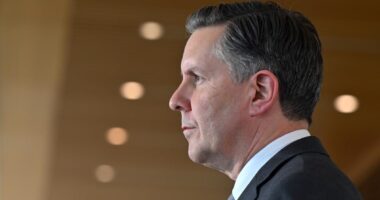— COVID WAS THE kick that jolted a creaking public health medicine system. It made it impossible for Ireland to avoid the question: is our public health system keeping us all healthy and well? Public health doctors are concerned not with the health of individuals, but the wider health of populations, and the factors that can cause disease and suffering. A good public health system is focused not just on diseases, but also on keeping population groups, of all ages and backgrounds, healthy and well. But after two decades of campaigning, it was the pandemic that finally saw this speciality given due recognition, according to experts that spoke to Noteworthy. Promises were made to recruit public health doctors, nurses and other professionals and, crucially, to put in place the systems needed to support them. Speaking in April 2021, then acting chief medical officer, Dr Ronan Glynn, said: “The ongoing evaluation and improvement of our health services and the use of health data and intelligence to inform those developments, should provide a fundamental underpinning to the necessary transformation that will be required in our approach to the improvement of the public’s health in the years to come.” Sasko Lazarov / RollingNews.ie Dr Ronan Glynn alongside other experts on the same week in 2021 that a reformed consultant-led public health model was announced Sasko Lazarov / RollingNews.ie / RollingNews.ie Since then, one of the biggest changes has been the agreement of a consultant contract for public health medicine doctors, which was widely seen as crucial for attracting people into the profession. Almost two years on from Glynn’s hopeful vision, what has changed? Over the past few months, for our SYSTEM OVERLOAD investigation, Noteworthy sought to answer the question of how our system of public health medicine is working, and can now report: Key stakeholders, including public health experts, say that the recruitment process has broadly been a success, with targets for recruiting public health staff mainly on track. Although recruitment has been largely successful, public health experts emphasise that there is work to be done in establishing systems to support them Data collection and analysis lag behind, with improved systems vital for public health professionals to make an impact The new public health function will likely promote connection between poverty, low income and poor health outcomes, which may lead to challenging questions for future Governments about how they are tackling social inequity through policy Public health experts say that what happens next – and whether or not the Sláintecare reforms are implemented – will be vital for the collective health of the nation. — What is public health? “Public health refers to all the factors that influence our health and wellbeing,” said Sara Burke, Associate Professor in Health Policy and Management and Director of the Centre for Health Policy and Management at Trinity College Dublin. “It is not just about medicine but also our income, our access to clean air, job opportunities and relationships,” said Burke. “Good public health means that everyone has access to the best or highest-quality wellbeing.” Professor Sam McConkey of the Royal College of Surgeons in Ireland is an expert in infectious diseases. He was among those at the forefront of the response to Covid-19. He said that, when it comes to the health of the nation, Ireland performs relatively well. The country has low child and maternal mortality, which have improved since the 1980s, and people are now living into their 80s or, sometimes, 90s. He also pointed to falling road deaths due to awareness campaigns. In September 2022, the first report of the Healthy Ireland Outcomes Framework noted reduced smoking rates, a decline in the numbers of people who are overweight or obese, growing life expectancy, declining incidence of cancer and lower mortality rates, and high participation in screening and immunisation programmes. The Global Burden of Disease Index, which uses measurements of death and disease, also sees Ireland perform relatively well, with most, for example, able to access hospitals, vaccines and public sanitation systems. Sam Boal / RollingNews.ie Correspondence between Minister Stephen Donnelly and then HSE CEO Paul Reid in 2021 was obtained by Noteworthy Sam Boal / RollingNews.ie / RollingNews.ie CHALLENGE: Staffing The public health system has long suffered from funding and staff shortages, and these shortages have real impacts for people – particularly children and those who are vulnerable. In June 2022, The Journal reported that the HSE had withdrawn critical checks for some children in west Dublin due to a shortage of public health nurses. One of the biggest challenges for the public health system was that doctors were not awarded consultant status, and so could earn more money in other sectors. In a report commissioned by the Department of Health by consultancy firm Crowe Horwath, and delivered in April 2018, one of the key recommendations was a strengthened contract for consultants in public health medicine. Many of the developments, goals and targets in public health have been guided by this report. In correspondence between Minister for Health Stephen Donnelly and former HSE CEO Paul Reid in March 2021, obtained by Noteworthy via a Freedom of Information (FOI) request, Donnelly said that he was committed to strengthening and reforming how public health medicine operates in Ireland. This was a position that Reid welcomed as signalling “considerable commitment to delivering a reformed Public Health Medicine service by building the enhanced multidisciplinary teams envisaged for the future model”. You can view the email correspondence that Noteworthy obtained via FOI here. But, in an early warning sign, Reid said that, while the HSE was making every possible effort to deliver on the commitment of 255 whole time equivalent (WTE) posts for the public health function, they faced a “very competitive recruitment environment, particularly for specialist medical and clinical staff”. And yet, the HSE, against the odds, seems to have overcome this potential obstacle. In October 2020, a Public Health Workforce Plan was agreed, and €17.3m was committed to deliver 250.6 additional whole time equivalent (WTE) permanent multidisciplinary resources, both to support pandemic response and to implement a new service delivery model for public health. This included 18 medics, 59.6 nurses, 59 surveillance and epidemiology experts, 113 managers and administrators, and one additional staff member for the Health Protection Surveillance Centre (HSPC). Figures provided to Noteworthy by the HSE show that 94% of these resources are now in place. Of the 250.6 WTE posts, 234.6 have been filled, with 225.6 of the posts in post within the services. This is in stark contrast to many other areas of health spending. For example, last year for our SILENT TREATMENT investigation, Noteworthy reported that only 55% of the staff for three new specialist eating disorder teams promised for 2021 had been recruited. An agreement with the Irish Medical Organisation (IMO) provided for a consultant-led public health model, with a three-phase process to the creation of 84 consultant posts by the end of 2023. This included (i) the establishment of 34 consultant posts by the end of June 2022, (ii) 30 by the end of June 2023 and (iii) 20 by the end of December 2023. A spokesperson for the HSE said that all the phase one public health posts are in place and onboarded. An interim appointment to the post of National Director is in place, pending the permanent appointment of a candidate through a second round campaign which is currently progressing through the Public Appointments Service. In a letter from Donnelly to HSE chair Ciarán Devine in April 2021, obtained by Noteworthy, the Minister said he wanted “to have reached a position by the end of February 2022 that can demonstrate that the implementation of the model and the appointment of consultants is delivering reform and the desired outcomes are being progressed”. Recruitment of phase two’s posts is progressing in line with the target timelines. The HSE has confirmed that significant progress towards the implementation of the agreement with the IMO has been reached and, on that basis, sanction was received in the third quarter of 2022 from the Department of Public Expenditure and Reform, and the Department of Health, to progress phase two. Recruitment of phase three is contingent on the completion of a review process in February 2023 which is currently underway. “Public health medicine doctors were treated as second-class professionals for a long time,” said Burke. “Now that they are consultants and on better pay, it will help to bring about reforms. “If we do pull off the Sláintecare reforms – and it is a big if – these consultants would be a key part of the teams allocating services and planning for prevention and care.” However, she added that ”they remain under-resourced and are dealing primarily with infectious diseases, rather than population health.” Health resources in Ireland are primarily provided around historic population data rather than on need and services have struggled to keep up with a growing population. Photo – Sara Burke Photo – Sara Burke CHALLENGE: Equality Public health is intrinsically and inextricably linked with social inequality, and there is copious evidence that a truly effective system of public health medicine should centre the needs of society’s poorest and most vulnerable members. A recent study, led by researchers at the University of Limerick’s Physical Activity for Health (PAfH) Research Centre, found that policy decisions are much more effective at preventing non-infectious diseases than the actions that any one individual can take. This suggests that campaigns based around individual behaviour change – for instance to exercise more, eat less, meditate – are a relatively poor investment: people simply can’t take these actions when they have no money or time. “Our health is socially determined, with about 70% decided by housing, education and opportunities for education and employment, especially the opportunities for employment at a young age,” said Dr Anne Dee, chair of the public health committee at the IMO. “The other 30% is decided by the health service and access to health. We know that, during Covid, poorer people suffered more: they were more likely to catch it, more likely to be sick from it and more likely to die from it. “They were also more likely to be affected by the control measures. “We know that this is always the case: poorer people’s health suffers from inequality. The average lifespan of members of the Traveller community is lower, and lower socioeconomic groups are more likely to suffer from heart disease and lung issues. “Until now, public health did not have the capacity to deal with these issues, despite the fact that they were very vexed by them. This is a big priority of the reformed public health function across all domains, local, regional and national.” The first section of Sláintecare is about population health, but Burke said that there is a gap between knowledge of public health – where we have useful data – and political will to improve population health. “We do a lot of campaigns around individual behaviour, on how to eat less and exercise more, or not to smoke, rather than the big policy shifts like making it possible for children to walk to school and access play areas, or for people to have access to good public transport.” Photo – Derick P. Hudson / Shutterstock Photo – Derick P. Hudson / Shutterstock / Shutterstock It is harder to be unhealthy in more equal societies like Germany or Scandinavia, said Burke. “The way to make poorer communities healthier is to provide more opportunities, engage them in the planning process and ask them: what are your health needs? If someone is afraid to let their children out to play because of drugs and joyriding, those children are more likely to be sitting in, watching TV. Unless we address housing, environmental and income inequalities, we are pissing in the wind when it comes to public health. “The inverse law in healthcare is that the people who need the services get the least, and wealthier people – who have the articulacy to [understand and work] the system – get over-tested and overtreated,” said Burke. CHALLENGE: Systems With the staffing needs on track, IMO’s Dr Anne Dee told Noteworthy that the next steps will involve ensuring that different parts of the health service talk to one another. “It is an exciting time to work in public health,” she said. “A big part of the reform is ensuring that the right systems are in place and that collaborative working, involving different people, happens. “We are just at the beginning of a major restructuring of the public health function. It is a huge body of work and it will be a challenge to stay focused on [both] recruitment and restructuring. We need to keep up the momentum.” One of the major reforms has focused on creating six new public health areas, aligned to future Sláintecare areas, and these have been operational since May 2022. Linked to this is the development of a health protection strategy, led by the National Clinical Director of Health Protection and covering the years 2022-27. Burke said however, that there should be scope to expand the number of diseases that GPs manage, and that more incentives are needed for GPs to take part. In any case, she says, more nurses, physiotherapists, occupational therapists and healthcare workers are needed in the community. “Most countries have fairly integrated community care systems, with doctors, nurses, physiotherapists, midwives and pharmacists all working together in some shape or form,” said Anthony Staines, professor of health systems at DCU and member of Fine Gael. His work involves gathering information on healthcare and healthcare information, including who owns the data and how it is used and controlled. “Here, GPs are regarded as peripheral by the HSE, whereas they should be at the centre of care, and there are not enough public health nurses,” he said. “Public health experts are not GPs, but it is GPs who can see the needs of the local population [from a public health perspective].” Photo – Anthony Staines Photo – Anthony Staines CHALLENGE: Data All the public health staff in the world will amount to nothing if we do not have strong, evidence-based data about the collective health of the nation, the health of local and regional populations and the health of various subsets, including children, Travellers, migrant populations and the LGBTQI+ community. “Health intelligence is crucial,” says Dee. “We cannot improve what we don’t measure and, as yet, we don’t measure inequalities, record ethnic identifiers or code health information by area.” Under a new EU health regulation, the European Health Data Space, member states including Ireland will be required to gather information on health equity. In turn, this will allow member states to gather evidence, particularly on those parts of the population who are most vulnerable to health inequalities – primarily poorer people. It should, with the right political will, inform public policy and reduce the inequalities that cause the mortality rate in the least advantaged socio-economic group to be twice as high as those in the most advantaged group. Photo – Gorodenkoff / Shutterstock Photo – Gorodenkoff / Shutterstock / Shutterstock One of the early priorities, experts say, will be the establishment of a unique health identifier for each patient, allowing their files to be shared among health professionals. During the course of this investigation, Noteworthy spoke to multiple clinicians about their frustrations in accessing data about their patients from other hospitals, although some systems are now being put in place, particularly in the new National Children’s Hospitals. This is a frustration also shared by patients who access services across hospitals. It’s not straightforward, and there are many issues around data protection and technical infrastructure, but a new national patient identifier would not just address these issues, but also aid with data collection on the health of the population. “The State has historically been resistant to the idea of taking responsibility for the health of the nation,” TD Róisín Shortall told Noteworthy. Shortall served as a Minister of State at the Department of Health between 2011 and 2012, before later co-founding the Social Democrats. Shortall also chaired the All-Party on the Future of Healthcare, which produced the Sláintecare plan. The best model [for a good public health system] would be based on data and evidence in relation to health. Shortall said that “a clear picture of what is happening” is needed. A two-tier healthcare system where IT systems do not talk to each other and there is a lack of adequate connections prevents this, she added. Sam Boal / RollingNews.ie Shortall (centre) alongside the new Minister of State for Public Health, Hildegarde Naughton (right), when a 10-year strategy report for health care and policy was launched in 2017 Sam Boal / RollingNews.ie / RollingNews.ie Ireland does gather some data on the health of the population, through the HSE’s Health Atlas Ireland, an open source application enabling access to key health related datasets, developed by the National Health Intelligence Unit. Burke, says, however, that this is not easily available to those outside of the HSE. Both Burke and Staines said that we are not making enough use of this data to produce good public health policies. “I have been arguing for a more coherent approach to collecting information about healthcare, an activity where over €20 billion is spent,” Staines said. “But we know more about the health and lives of Irish calves than we do about Irish children… The role of public health in health policy is quite limited.” One example of how good data can lead to better health outcomes is the National Cancer Registry, which was established in 1991. “When [Ireland] began to systematically collect this data, we had information on outcomes, and it played a part in a push for reform of cancer services under Minister for Health Mary Harney back in 2007,” said Burke. “Stroke research also led to a reform of stroke services, which is much improved in hospitals but, when it comes to services in the community, remains poor. So, while we can use cancer and stroke data, the systems are not talking to one another enough, and so we lack adequate systemic data that would allow for early intervention. The first section of Sláintecare is about population health, but Burke said there is a gap between knowledge of public health – where we have useful data – and political will to improve population health ‘We are only at the beginning’ The reform of public health in Ireland, to date, appears to be one of the rarest types of health news stories: a broadly positive one. What caused it to work well, and what can we learn from it? Dee says that there were a number of decisive factors at play: Leadership from the office of the chief clinical officer, Dr Colm Henry The relatively small size of this speciality, with only 84 consultants, made it easier to bring people on board Crucially, the groundwork to bring all stakeholders to a common agreement was laid early on in the process as various parts of the public health function agreed a consensus statement on what needed to happen With this in place, public health experts had an agreed set of proposals and wishes that they could bring to Government The Covid-19 pandemic highlighted the critical importance of the public health function and, while the initial focus was on infectious disease, it opened up the possibility of a wider conversation Despite the success of the HSE’s recruitment campaign, and the establishment of a long-sought consultant grade for public health medicine doctors, there are many ways in which this new era could end in failure. Leon Farrell / RollingNews.ie The IMO’s Dr Anne Dee mentions leadership from the office of the chief clinical officer Dr Colm Henry (above) when speaking about what worked well Leon Farrell / RollingNews.ie / RollingNews.ie Momentum could be lost if, as hoped, no major new Covid outbreaks or other infectious diseases emerge. However, when monkeypox – now renamed mpox- came to Ireland in the summer of 2022, it was another timely reminder that Covid and respiratory diseases were not the only illnesses we needed to be protected from. The new function will require leadership and colleagues working together to bed in the systems, systematically gather and analyse data and use it to improve health outcomes, the IMO’s Anne Dee said. Ireland is coming from a low base: the HSE’s population directorate was diminished by pay cuts during the recession of 2008-13. A lack of senior level staff to feed into decision making, coupled with a service that was not consultant-led, caused problems, and Dee said we must learn from our mistakes and not repeat them. But, she added, in any future recession or austerity process, the public health function would be vulnerable to budget cuts, with ministers likely to argue it is better to implement them here, where doctors do not directly face patients, than in a critical, patient-facing role, such as cancer services. Ireland is on track to have 84 public health medicine consultants in place by the end of 2023, but Dee says this is still relatively low by head of population. “Once we have a chance to show our value, our benefit should become obvious,” she said. “We are only at the beginning.” — Later today, as part of this series, Noteworthy examines the Irish response to monkeypox and how the strength of the gay community response was ‘key’ This investigation was proposed and funded by readers of Noteworthy, the crowdfunded investigative journalism platform from The Journal. Please support our work by submitting an idea, helping to fund a project or setting up a monthly contribution to our investigative fund HERE
Subscribe
Login
0 Comments





